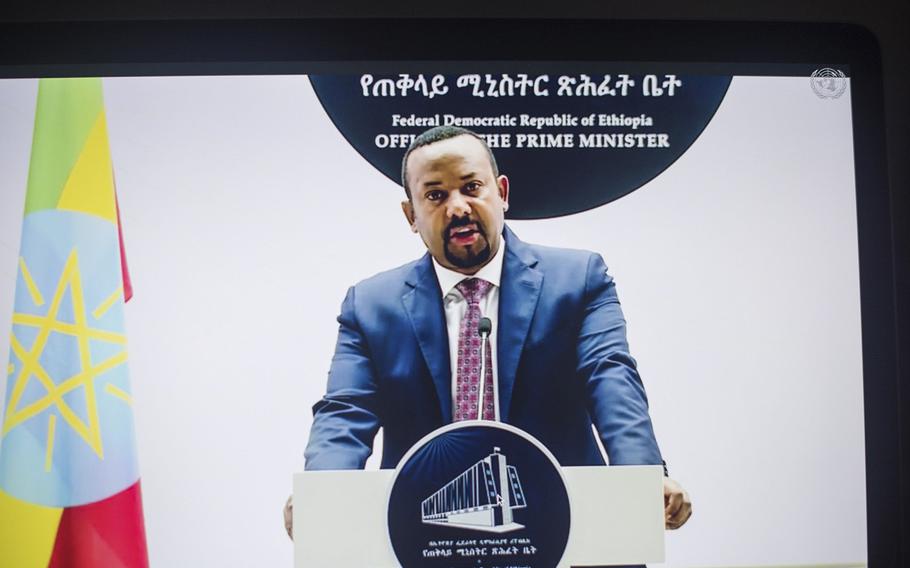
Abiy Ahmed, Ethiopia’s prime minister, speaks during the United Nations General Assembly on Sept. 25, 2020. (Tiffany Hagler-Geard/Bloomberg )
Ethiopia's government and rebels from the northern Tigray region accused each other violating a tenuous truce they agreed on in March after more than 16 months of fighting, dampening hopes that a permanent peace accord is within reach.
The conflict devastated millions of peoples' lives and left most of Tigray without power and incommunicado, while souring Ethiopia's reputation as one of Africa's top investment destinations. The two sides' leaders have yet to meet face to face, and ongoing animosity between them has impeded efforts to distribute aid and delayed reconstruction.
About 89% of Tigrayan households are food insecure, a 6 percentage point increase since November 2021, the World Food Programme said in a report released on Friday. It also found that at least half of pregnant and lactating women in the region were acutely malnourished. While Ethiopian Prime Minister Abiy Ahmed has allowed some aid to enter the region, relief agencies say much more is needed.
The Tigray region's military command this week accused Ethiopian soldiers of bombarding its forces around the town of Dedebit in the western part of its territory earlier in the week. No casualties were reported.
The attack was "a deliberate act authorized at the highest level," the command said in an Aug. 17 statement. It warned that force now appeared to be "the only viable route" for its annexed territory in Western Tigray to be liberated.
Western Tigray, a flat swathe of fertile farmland bordering Sudan, was seized by forces from the neighboring Amhara region soon after the civil war erupted in November 2020, forcing thousands of residents to flee. Regional forces and militiamen from Amhara backed Abiy in the war.
Billene Seyoum, Abiy's spokeswoman, told reporters in Addis Ababa, the capital, on Thursday that a government panel has made a proposal for peace talks "within the coming weeks" with the aim of formulating a lasting settlement between the opposing sides, and that they must be held "without pre-conditions." Services to Tigray could only be restored once requisite security and administrative arrangements have been made, she said.
But Tigray's government said it won't participate in the talks until its control of Western Tigray is restored, and Getachew Reda, a senior official, said on Thursday that discussions must be preempted by the resumption of basic services to the region.
Billene meanwhile accused the Tigray forces of using humanitarian channels to accumulate weapons, and illegally acquiring foreign and local currency to fund a renewed military campaign. She didn't address the Tigray region's accusations that federal forces had staged renewed attacks.
A standoff between the government and the Tigray People's Liberation Front, which dominated the country's ruling coalition from 1991 until Abiy took power in 2018, steadily heightened after the prime minister set about consolidating power under his newly formed Prosperity Party. Fighting erupted after Abiy ordered a military incursion into Tigray after accusing forces loyal to the TPLF of attacking a military base to steal weapons.
The renewed tensions have coincided with warnings about a deterioration of living conditions within Tigray. World Health Organization Director-General Tedros Ghebreyesus described the situation there as the "worst humanitarian crisis in the world," with 6 million people still unable to access basic services, and he bemoaned the lack of attention being paid to it by the international community.
"Maybe the reason is the color of the skin of the people," Tedros, a Tigrayan, told a virtual media briefing on Aug. 17.
Selamawit Kassa, state minister of the Ethiopian government's communication service, said Tedros's comments fed into an organized propaganda campaign run by the TPLF and paid lobbyists to "divert attention away from the government's decision to resume peace talks."
___
Bloomberg's Fasika Tadesse contributed to this report.